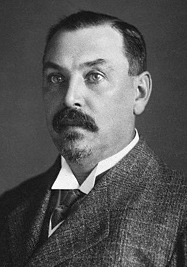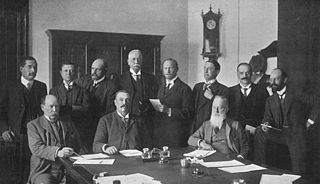| |||||
| Decades: | |||||
|---|---|---|---|---|---|
| See also: | |||||
The following lists events that happened during 1943 in South Africa.
| |||||
| Decades: | |||||
|---|---|---|---|---|---|
| See also: | |||||
The following lists events that happened during 1943 in South Africa.

Field Marshal Jan Christian Smuts, was a South African statesman, military leader and philosopher. In addition to holding various military and cabinet posts, he served as prime minister of the Union of South Africa from 1919 to 1924 and 1939 to 1948.

Sir Patrick Duncan, was the sixth Governor-General of the Union of South Africa, holding office from 1937 until his death in 1943.

Louis Botha was a South African politician who was the first prime minister of the Union of South Africa, the forerunner of the modern South African state. A Boer war veteran during the Second Boer War, Botha eventually fought to have South Africa become a British Dominion.

Nicolaas Jacobus de Wet, PC, QC was a South African politician, lawyer, and judge who was Chief Justice of South Africa and acting Governor-General from 1943 to 1945.
The following lists events that happened during 1948 in South Africa.
The following lists events that happened during 1923 in South Africa.
The following lists events that happened during 1914 in South Africa.
The following lists events that happened during 1913 in South Africa.
The following lists events that happened during 1910 in South Africa.
The following lists events that happened during 1902 in South Africa.
The following lists events that happened during 1941 in South Africa.
The following lists events that happened during 1921 in South Africa.
The following lists events that happened during 1942 in South Africa.
The following lists events that happened during 1924 in South Africa.
The following lists events that happened during 1908 in South Africa.
The following lists events that happened during 1945 in South Africa.
The following lists events that happened during 1944 in South Africa.
The following lists events that happened during 1940 in South Africa.

The National Convention, also known as the Convention on the Closer Union of South Africa or the Closer Union Convention, was a constitutional convention held between 1908 and 1909 in Durban, Cape Town and Bloemfontein. The convention led to the adoption of the South Africa Act by the British Parliament and thus to the creation of the Union of South Africa. The four colonies of the area that would become South Africa - the Cape Colony, Natal Colony, the Orange River Colony and the Transvaal Colony - were represented at the convention, along with a delegation from Rhodesia. There were 33 delegates in total, with the Cape being represented by 12, the Transvaal eight, the Orange River five, Natal five, and Rhodesia three. The convention was held behind closed doors, in the fear that a public affair would lead delegates to refuse compromising on contentious areas of disagreement. All the delegates were white men, a third of them were farmers, ten were lawyers, and some were academics. Two-thirds had fought on either side of the Second Boer War.